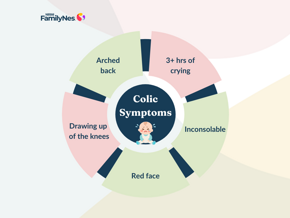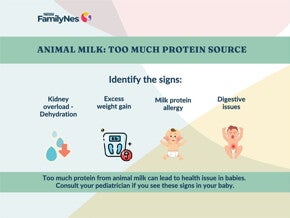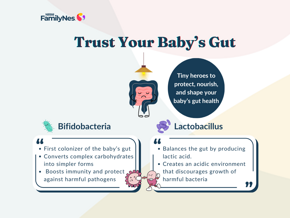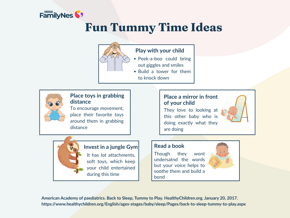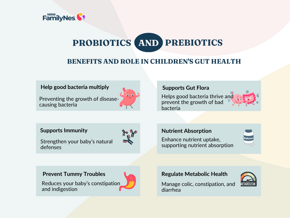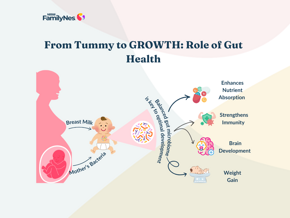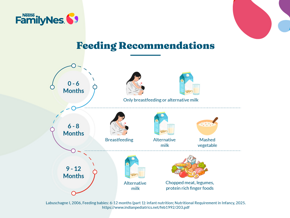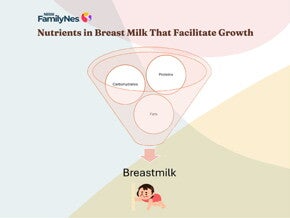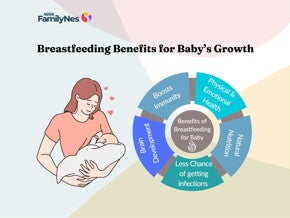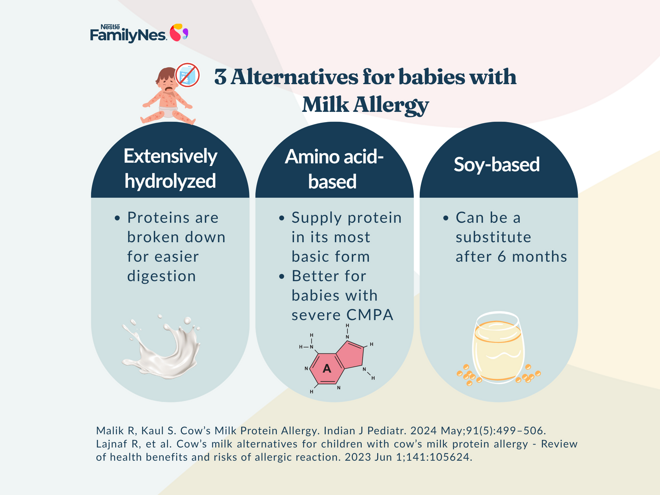
If your baby is unusually fussy after feeding or develops rashes, you might wonder: Could this be a milk allergy?
It happens when your baby’s immune system mistakenly thinks that milk proteins are harmful. This can cause discomfort and even more serious reactions. Although it can be worrying, recognizing the signs early and knowing what to do can help your baby feel better in less time.
Milk allergies in babies are usually caused by cow’s milk proteins. The reaction can be mild or severe, and it can show up in different ways. According to experts, cow's milk allergy protein (CMPA) affects about 1.5 -3 % of babies. So, if your baby is showing signs of discomfort after drinking milk, it's important to take note and talk to your pediatrician.(1)
How to Spot Milk Allergy Signs
When it comes to detecting a milk allergy, the symptoms are not the same. There are two kinds of reactions: immediate and delayed.(2)
Immediate Reactions (occur within minutes to a few hours of consuming milk):
- Skin rashes, hives, or swelling around the mouth
- Vomiting or diarrhea
- Difficulty breathing or wheezing
Delayed Reactions (take hours or even days to appear):
- Continued diarrhea or difficulty with digestion
- Colic, fussiness, or refusing food
- Eczema or rashes
If you observe these symptoms, discuss them with your doctor. Early detection is vital in controlling your baby's allergy as well as their comfort.(3)
Could Your Baby’s Tummy Troubles Be Caused by Milk?
If your baby seems fussy, gassy or uncomfortable after feeding, milk may be the cause. Babies can’t digest milk due to lactose intolerance or protein allergy, and this will cause discomfort like gas or upset stomach.
How Milk Allergies Differ from Lactose Intolerance in Newborns
Milk allergies and lactose intolerance may seem similar, but they are quite different. A milk allergy is when your baby’s immune system reacts to the proteins in the milk, producing symptoms such as rashes on the skin, breathing problems, tummy troubles such as vomiting or diarrhea, and even swelling. Since milk allergy can affect multiple systems in the body—including the skin, digestive system, and respiratory tract—it’s important to recognize the signs early and consult your pediatrician for proper diagnosis and care.(4) But lactose intolerance means your baby’s tummies can’t break down the milk sugar, and it will cause gas and tummy pain.(5)
Alternatives to keep your baby nutritionally balanced
If your baby suffers from Cow's Milk Protein Allergy (CMPA), it implies that you must eliminate cow's milk protein from their diet and replace it with alternatives.(6,7)
Some alternatives available to help you deal with it:
Extensively hydrolyzed alternatives:
This supplement has broken-down proteins, so it is more easily digestible for babies with mild to moderate CMPA. These can alleviate allergic reactions and supply the necessary nutrition.
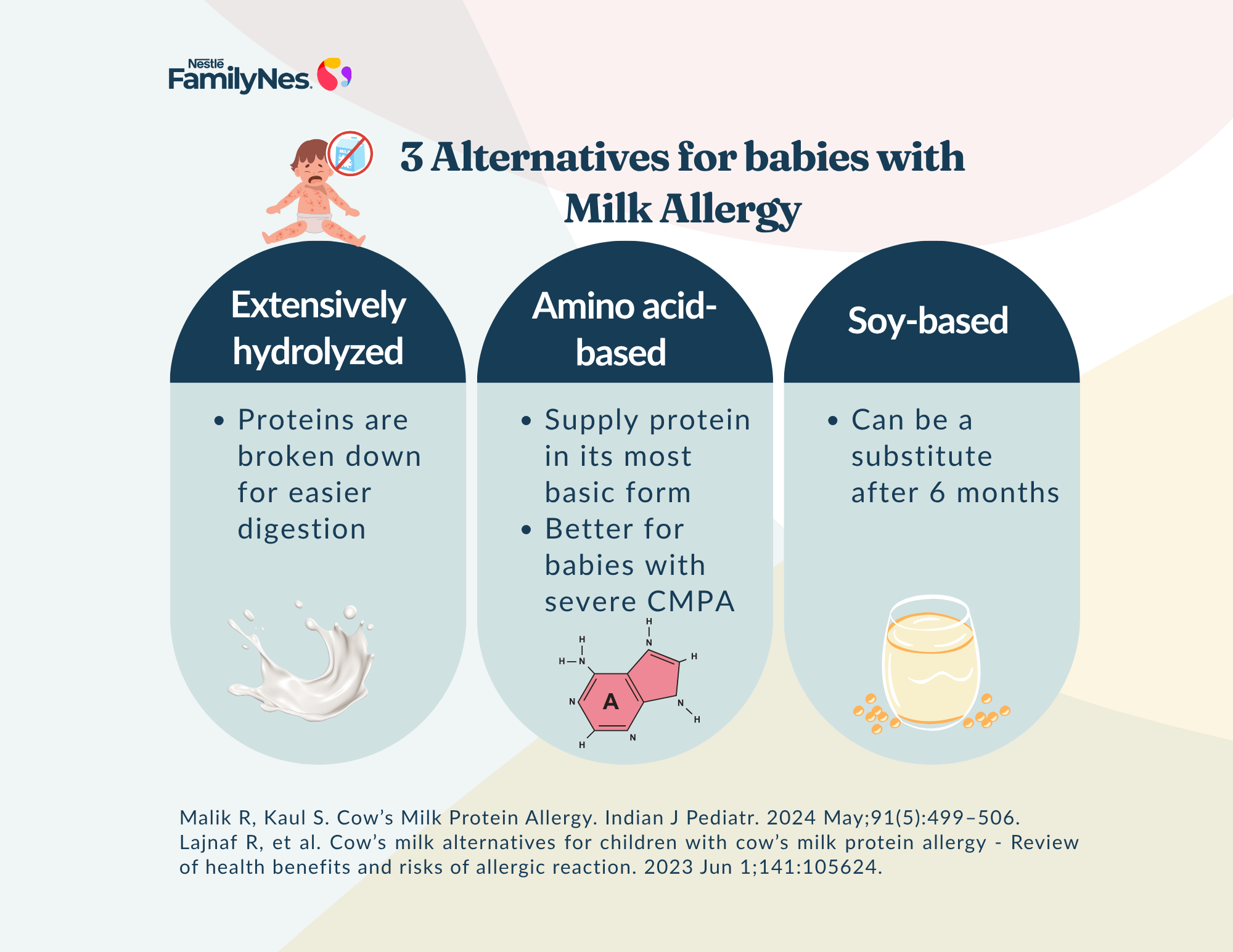
Amino acid-based alternatives:
Amino acid-based alternatives are better for babies with severe CMPA. These can supply protein in its most basic form and are usually well-tolerated, even by babies with more severe allergies.
Soy-based alternatives:
Soy-based alternatives after 6 months can be a substitute but first consult your pediatrician. Some infants with CMPA can also have a soy allergy, so it is best to do a quick test before switching.
Always consult with your pediatrician first before attempting alternatives to make sure your baby receives the proper nutrition and best care for their individual needs!
References
- Høst A. Frequency of cow’s milk allergy in childhood. Ann Allergy Asthma Immunol. 2002 Dec;89(6 Suppl 1):33–7.
- Mehaudy R, Jáuregui MB, Vinderola G, Guzmán L, Martínez J, Orsi M, et al. Cow’s milk protein allergy; new knowledge from a multidisciplinary perspective. Arch Argent Pediatr. 2022 Jun;120(3):200–6.
- Koletzko S, Niggemann B, Arato A, Dias JA, Heuschkel R, Husby S, et al. Diagnostic approach and management of cow’s-milk protein allergy in infants and children: ESPGHAN GI Committee practical guidelines. J Pediatr Gastroenterol Nutr. 2012 Aug;55(2):221–9.
- Edwards CW, Younus MA. Cow Milk Allergy. In: StatPearls [Internet]. Treasure Island (FL): StatPearls Publishing; 2025 [cited 2025 Apr 4]. Available from: http://www.ncbi.nlm.nih.gov/books/NBK542243/
- Darma A, Sumitro KR, Jo J, Sitorus N. Lactose Intolerance versus Cow’s Milk Allergy in Infants: A Clinical Dilemma. Nutrients. 2024 Jan 31;16(3):414.
- Malik R, Kaul S. Cow’s Milk Protein Allergy. Indian J Pediatr. 2024 May;91(5):499–506.
- Lajnaf R, Feki S, Ben Ameur S, Attia H, Kammoun T, Ayadi MA, et al. Cow’s milk alternatives for children with cow’s milk protein allergy - Review of health benefits and risks of allergic reaction. International Dairy Journal. 2023 Jun 1;141:105624.




